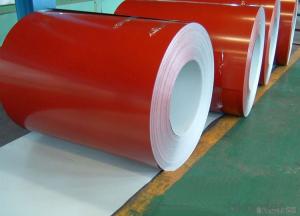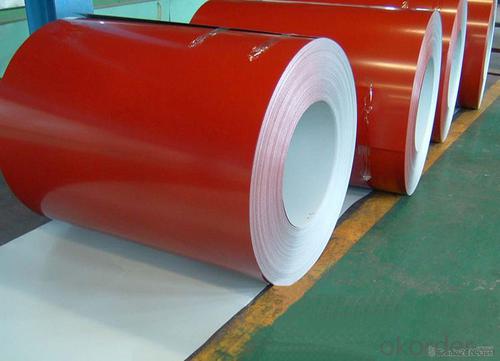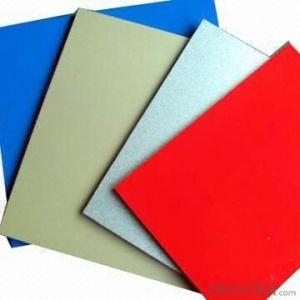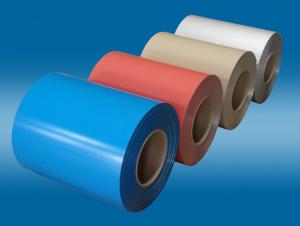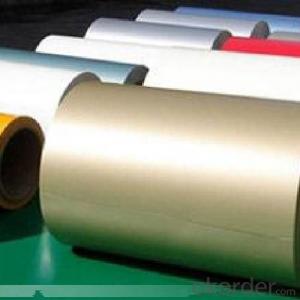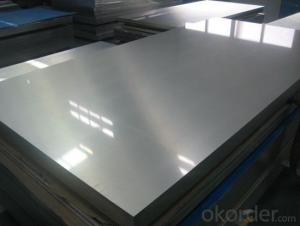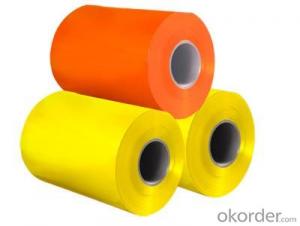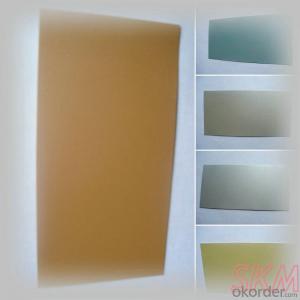Coil Aluminum Roll - Pre-Painted Aluminum Coil/Sheet Stone Series 1
- Loading Port:
- Shanghai
- Payment Terms:
- TT OR LC
- Min Order Qty:
- 5 m.t.
- Supply Capability:
- 2000 m.t./month
OKorder Service Pledge
OKorder Financial Service
You Might Also Like
Specification
Structure of Aluminium Coil/Sheet Stone Pre-painted Serie 1:
Aluminium coil/sheet are of a wide range of specifications, and they are widely used in:Interior: wall cladding, ceilings, bathrooms, kitchens and balconies, shutters, doors...Exterior: wall cladding, facades, roofing, canopies, tunnels,column covers , renovations...Advertisement: display platforms, signboards, fascia, shop fronts...
Main Features of Aluminium Coil/Sheet Stone Pre-painted Serie 1 :
1) High gloss
2) High flexibility
3) Impact resistance
4) Excellent weather-proof durability
5) Anti-ultraviolet
6) High erosion resistance
7) Stable color and gloss
8) Good mechanical processing performance
9) Abrasion resistance
Image of Aluminium Coil/Sheet Stone Pre-painted Serie 1:
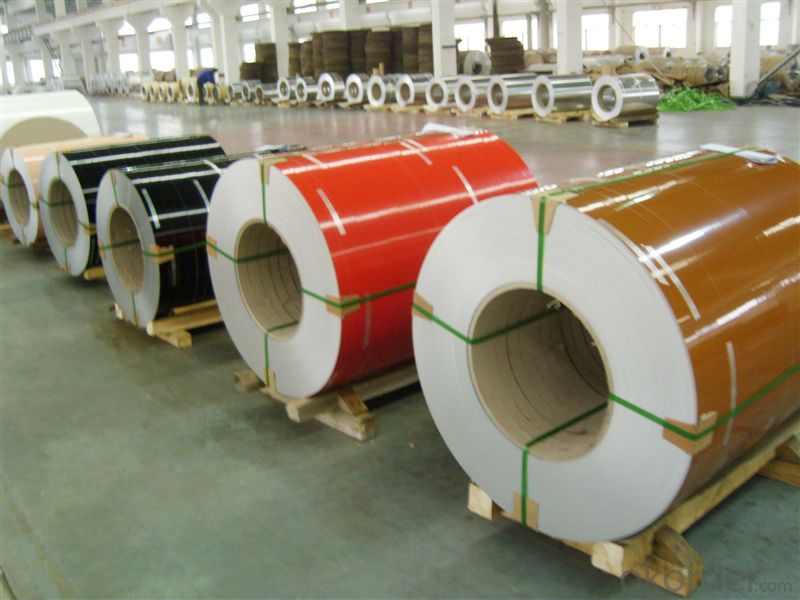
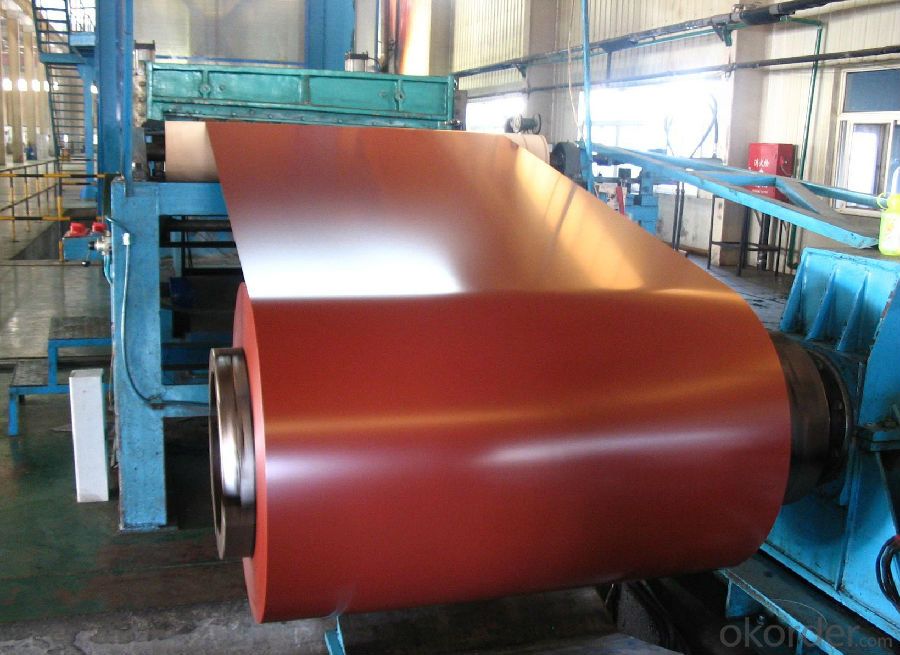
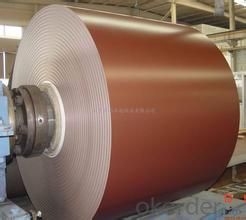
Specifications of Aluminium Coil/Sheet Stone Pre-painted Serie 1:
Alloy | A1100,A3003, A8011 etc |
Temper | H16,H18,H26 |
Thickness | 0.02-3.0mm |
Width | Standard width:1200 1240mm |
30mm-1500mm | |
Diameter | Outside dia:1200mm\1000mm\1240 |
Interior dia: 405mm,505mm | |
Weight | 1.5T/coil,2.5 T/coil,3.0 T/coil |
Coating | PE, PVDF, |
Surface | Color coated, Embossed, mill finish, |
Color | As to RAL |
Gloss | 10 - 90%(EN ISO-2813:1994) |
Coating Thickness | P E : more than 18 micron |
PVDF: more than 25 micron | |
Coating Hardness (pencil resistance) | More than 2h |
Coating adhesion | 5J(EN ISO-2409:1994) |
Impact Resistance | No peeling or cracking(50 kg/cm,ASTMD-2794:1993) |
Flexibility (T-bend) | 2T |
MEK resistance | More than 100 a.What is monthly capacity |
FAQ of Aluminium Coil/Sheet Stone Pre-painted Serie 1:
a.What is monthly capacity
---CNBM is one stated own company and our monthly capacity is about 2000tons.
b. Now which countries do you export your goods?
---Now we export to South East Asia,Africa, North America,South America ect.
- Q: Are aluminum coils suitable for architectural façade systems?
- Yes, aluminum coils are suitable for architectural façade systems. Aluminum is a highly versatile and durable material that can be easily shaped and manipulated to meet the specific design requirements of a building's façade. It is lightweight, corrosion-resistant, and can withstand harsh weather conditions, making it an ideal choice for long-lasting exterior applications. Additionally, aluminum coils can be coated with various finishes, such as paint or anodizing, to enhance their aesthetic appeal and provide additional protection against fading or chipping. The flexibility and versatility of aluminum coils make them an excellent option for architectural façade systems, allowing for creative and unique designs while maintaining durability and performance.
- Q: Are aluminum coils compatible with different welding methods?
- Yes, aluminum coils are compatible with different welding methods. Aluminum is a versatile metal that can be welded using various techniques such as gas tungsten arc welding (GTAW), also known as TIG welding, and gas metal arc welding (GMAW), also known as MIG welding. These methods are commonly used for welding aluminum coils due to their ability to produce high-quality welds with good strength and appearance. TIG welding is particularly suitable for aluminum as it allows for precise control of heat input and provides excellent weld quality. It uses a non-consumable tungsten electrode and an inert gas such as argon to shield the weld zone from atmospheric contamination. MIG welding, on the other hand, is a faster process that uses a consumable wire electrode and a shielding gas to protect the weld pool. It is widely used in industrial applications due to its efficiency and ease of use. In addition to TIG and MIG welding, other methods such as laser welding and friction stir welding can also be used for aluminum coils, depending on the specific requirements of the application. It is important to note that proper preparation, including cleaning and surface treatment of the aluminum coils, is crucial for achieving successful welds. This ensures the removal of any contaminants or oxide layers that may negatively affect the welding process. Overall, aluminum coils are compatible with different welding methods, and the choice of technique depends on factors such as the desired weld quality, production requirements, and the skills and equipment available.
- Q: How do aluminum coils contribute to energy-efficient lighting?
- The energy efficiency of lighting systems is greatly enhanced by aluminum coils. The exceptional thermal conductivity of aluminum coils is the main advantage when used in lighting applications. Due to its high thermal conductivity, aluminum can effectively transfer heat away from the light source and disperse it into the surroundings. This property prevents lighting fixtures from overheating and ensures the longevity and efficiency of the entire system. Furthermore, aluminum coils are lightweight and have a high strength-to-weight ratio, making them perfect for creating compact and durable lighting fixtures. By utilizing aluminum coils, manufacturers can design and produce lighting products that are lighter and more efficient, thereby reducing overall energy consumption. Additionally, aluminum coils have a high reflectivity, allowing them to efficiently distribute and reflect light. This characteristic results in better light output and ensures that a larger portion of the emitted light is effectively utilized, thereby reducing energy waste. Moreover, aluminum is a highly recyclable material that can be reused and repurposed multiple times without losing its qualities. This recyclability contributes to the overall sustainability of energy-efficient lighting systems, reducing the environmental impact associated with their production and disposal. To sum up, aluminum coils contribute to energy-efficient lighting by effectively dissipating heat, reducing energy consumption through lightweight designs, optimizing light distribution, and promoting sustainability through recyclability.
- Q: How do aluminum coils contribute to sustainable energy systems?
- Aluminum coils play a crucial role in sustainable energy systems due to several reasons. Firstly, aluminum is a lightweight and highly conductive metal, making it an ideal material for the production of coils used in various renewable energy technologies such as wind turbines, solar panels, and electric vehicles. The lightweight nature of aluminum reduces the overall weight of these systems, thus increasing their efficiency and performance. Secondly, aluminum is abundant in nature and has a high recycling rate. It can be recycled repeatedly without losing its original properties, resulting in significant energy savings and reduced environmental impact. By using aluminum coils, sustainable energy systems can minimize their reliance on virgin materials and promote a circular economy. Furthermore, aluminum coils are corrosion-resistant and have excellent heat transfer properties. This makes them highly durable and capable of withstanding harsh weather conditions, ensuring the longevity and reliability of renewable energy systems. The durability of aluminum coils also reduces the need for frequent maintenance or replacements, thereby minimizing waste generation and conserving resources. Moreover, aluminum is a non-toxic material that poses minimal risks to human health and the environment. Unlike other metals, aluminum does not leach harmful substances into the soil or water, making it a safe choice for sustainable energy systems. Lastly, the use of aluminum coils in sustainable energy systems helps to reduce greenhouse gas emissions. As aluminum is lightweight, it requires less energy to transport and install, thereby reducing the carbon footprint associated with the manufacturing and installation processes. Additionally, the increased efficiency and performance of renewable energy systems using aluminum coils contribute to the displacement of fossil fuel-based energy generation, leading to a reduction in overall carbon emissions. In conclusion, aluminum coils contribute to sustainable energy systems by enhancing the efficiency, durability, recyclability, and environmental friendliness of renewable energy technologies. Their lightweight nature, corrosion resistance, and excellent heat transfer properties make them ideal for various applications, while their abundance and recyclability promote resource conservation and a circular economy. By using aluminum coils, sustainable energy systems can reduce their environmental impact, improve performance, and contribute to a cleaner and more sustainable future.
- Q: remember maybe a decade ago or so, copper used to be cheaper than aluminum. now it is the other way around, copper is more expensive. Even copper pennies cost more so I heard they are mixed with another metal to make a penny. What caused the change in value and when did it really start happening?In fact, copper has become valuble enough to steal. Some factories which have copper, have had their metals stolen, but outsiders who break into the factories to specifically take the copper. Then the factories started hiring security to prevent intruders from taking the copper.
- Actually Ba, aluminum requires a TON of energy to extract. You'll only see aluminum being purified near sources of cheap energy. As for why aluminum being cheaper, it's just more plentiful. It all comes down to scarcity, Plus, there is a lot of demand for copper, which will also drive up the price.
- Q: I would like to know why the ionic substance aluminium oxide doesn't dissolve in water.
- Aluminium gives away 3 electrons, and two aluminium atoms are combined with 3 oxygen atoms, the charge is just to great for it to gracefully dissolve.
- Q: What is the average lifespan of aluminum coils?
- The average lifespan of aluminum coils can vary depending on various factors such as the quality of the aluminum, the environment it is exposed to, and how well it is maintained. However, on average, aluminum coils can have a lifespan of around 15 to 20 years. With proper installation, regular cleaning, and maintenance, aluminum coils can last even longer. It is important to note that regular inspections and upkeep are crucial in prolonging the lifespan of aluminum coils and ensuring optimal performance.
- Q: This question asks about the various classifications of aluminum coil based on their properties and applications.
- <p>Aluminum coils are categorized into different grades based on their alloy composition and applications. The most common grades include 1000 series (99% pure aluminum), 3000 series (aluminum-manganese alloys), 5000 series (aluminum-magnesium alloys), and 6000 series (aluminum-magnesium-silicone alloys). Each grade has unique properties such as formability, strength, and corrosion resistance, which make them suitable for specific applications like construction, transportation, and packaging. The selection of the grade depends on the performance requirements of the end product.</p>
- Q: Inquiry about the feasibility of using a laser for cutting aluminum coils.
- <p>Yes, you can use a laser to cut aluminum coils. Laser cutting is a versatile process that can be used on a variety of materials, including aluminum. However, it's important to note that the type of laser and the specific settings should be appropriate for aluminum. Fiber lasers or CO2 lasers are commonly used for metal cutting, including aluminum. The process requires careful control of the laser's power, speed, and focus to achieve clean and precise cuts. Additionally, because aluminum is a reflective metal, special considerations such as the use of a protective cover gas and proper nozzle management are necessary to prevent damage to the laser equipment and to ensure the quality of the cut.</p>
- Q: What types of aluminum coil are best suited for specific applications?
- <p>Yes, different types of aluminum coil are better suited for specific applications. For instance, 1100 series aluminum coil, known for its high purity and excellent formability, is ideal for applications requiring deep drawing or bending. The 3003 series is often used for applications needing good corrosion resistance and formability, such as automotive parts and chemical equipment. The 5052 series offers a balance of strength and corrosion resistance, making it suitable for marine applications and aircraft structures. The 6061 series is known for its strength and is often used in construction and transportation industries. Each series has unique properties that make it more suitable for certain applications, so selection should be based on the specific requirements of the project.</p>
Send your message to us
Coil Aluminum Roll - Pre-Painted Aluminum Coil/Sheet Stone Series 1
- Loading Port:
- Shanghai
- Payment Terms:
- TT OR LC
- Min Order Qty:
- 5 m.t.
- Supply Capability:
- 2000 m.t./month
OKorder Service Pledge
OKorder Financial Service
Similar products
Hot products
Hot Searches
Related keywords
